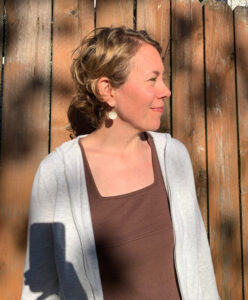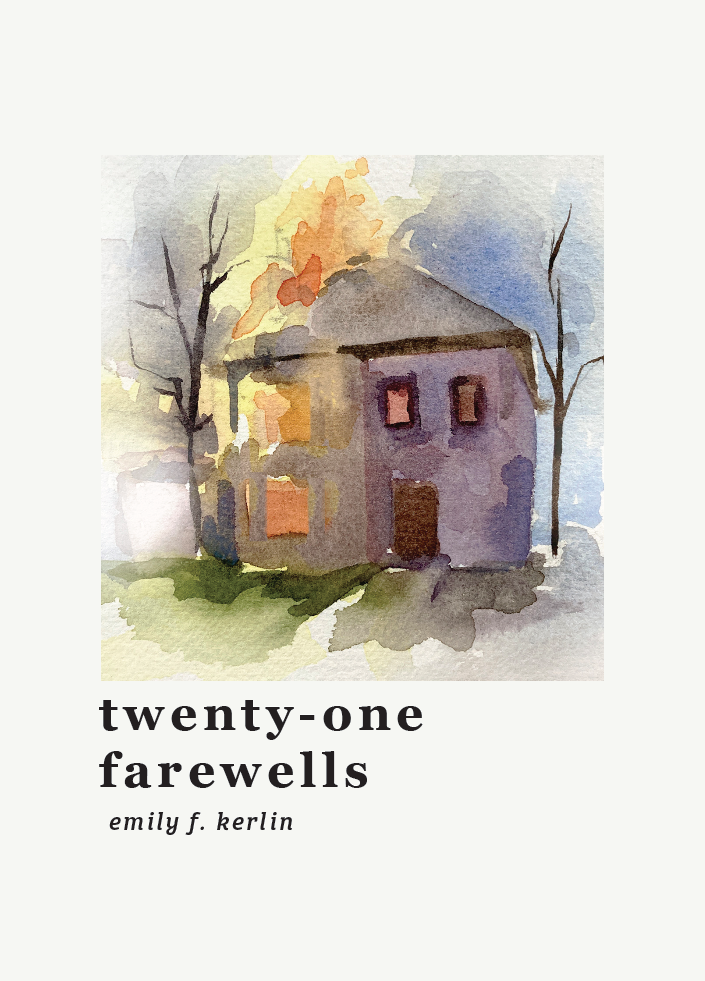Twenty-One Farewells
by Emily Kerlin
$15.00
From arcing fireworks to a bat in the belly of a church organ, Emily Kerlin’s poems explore the expansive territory of farewell. Each poem enshrouds the reader in a mystery of loss, some miniscule, others astronomical, coaxing them toward revelation. And in what striking forms these revelations manifest: a boy lost forever as “Mice scuttle in the hay,/ brittle leaves scratch/ in the autumn chill”; a husband struggling with “the constant problem/ of breath”; a plague and its wake of “crocuses pushing purple into this cold March morning.” Kerlin’s poetry compels you to lean in a little closer, to listen and look with more intention, then rewards you with “a spill of starlight,” and “the fragile lace of the human lung.”
 Emily Kerlin has called the following things home: a 13-tatami-mat flat in Japan, a gaff-rigged schooner in Manhattan, a stone home on an island in Lake Michigan, a blue left-zip mummy bag in British Columbia, a Guatemalan trimaran in Micronesia, a ski lodge in Montana and a small town near the Baltic coast of Germany. Her current home sits at 728 feet above sea level in Urbana, Illinois where she has been teaching the difference between “chicken” and “kitchen” to English language learners in public schools for the last 20 years. She has published poems in Intima: A Journal of Narrative Medicine, Bridge, Storm Cellar, The Pittsburg Poetry Journal, The MacGuffin, Split Rock Review and Blue Mountain Review.
Emily Kerlin has called the following things home: a 13-tatami-mat flat in Japan, a gaff-rigged schooner in Manhattan, a stone home on an island in Lake Michigan, a blue left-zip mummy bag in British Columbia, a Guatemalan trimaran in Micronesia, a ski lodge in Montana and a small town near the Baltic coast of Germany. Her current home sits at 728 feet above sea level in Urbana, Illinois where she has been teaching the difference between “chicken” and “kitchen” to English language learners in public schools for the last 20 years. She has published poems in Intima: A Journal of Narrative Medicine, Bridge, Storm Cellar, The Pittsburg Poetry Journal, The MacGuffin, Split Rock Review and Blue Mountain Review.
We are thrilled the announce the winner of our 2023 Dare to be Chapbook Contest, Emily Kerlin, for her manuscript, Twenty-One Farewells! From our Judge, Emily Patterson, “Twenty-One Farewells is a meditation on loss in its many forms: loss of earlier selves, of childhood innocence; loss in nature, in the death of animals both wild and domestic; loss of trust, home, expectation, connection.”
Twenty-One Farewells tells of the many ways loss can manifest in our lives through addiction, mental illness, pandemic shutdown, divorce, parenting, and in our intersection with the natural world around us. I look at my mother and my daughter–and really all women– and feel connected through our farewells, the ones that anguish us and the ones that liberate us.


